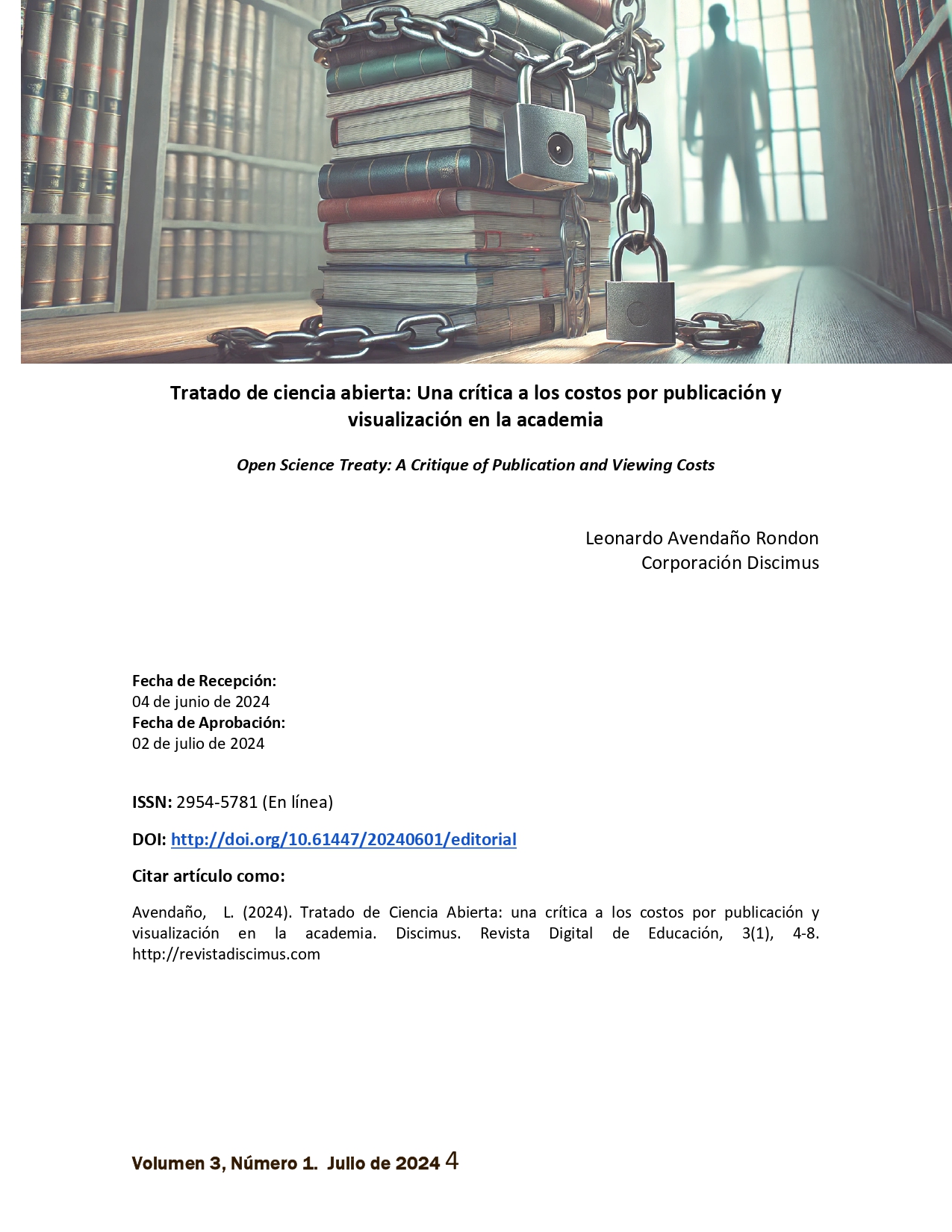Open Science Treaty: A Critique of Publication and Viewing Costs in Academia.
DOI:
https://doi.org/10.61447/20240601/editorialKeywords:
Open Science , publication , APC, human RightsAbstract
Open Science has gained momentum as an essential paradigm in the pursuit of a more equitable society, where knowledge is considered a universal human right. However, we are concerned about how profit-driven motives have infiltrated the academic sphere, primarily through the imposition of Article Processing Charges (APCs) and the restriction of access to information via paywalls. From the perspective of Corporación Discimus and Revista Discimus, these practices undermine the very essence of academia and hinder the free flow of knowledge.
In 2021, UNESCO adopted the Recommendation on Open Science, an international framework designed to make science more accessible, inclusive, and transparent. This recommendation emphasizes the importance of collaboration and information sharing for the advancement of science and societal well-being. Recognizing that gaps in technology and innovation can be reduced both between and within countries, UNESCO advocates for concrete actions to ensure a fair and equitable operationalization of Open Science at global, regional, national, and individual levels. The recommendation promotes open access to scientific publications, research data, and other resources, encouraging broader participation from diverse and underrepresented actors in the scientific community.
Downloads
References
Avendaño Rondon, L. (2023). La verdad en el aula: una aproximación teórica. Discimus. Revista Digital De Educación, 2(1), 18-30. https://doi.org/10.61447/20220601/UMPv21003
Cruz Castillo, Alba Lucía, et al. “Luchas Y Desarraigos Por La Tierra Y Resistencias Juveniles Por El Derecho a La Ciudad En El Postconflicto: Una Mirada a La construcción De Paz Desde La Periferia De Bogotá”. Discimus. Revista Digital De Educación, vol. 2, no. 2, Feb. 2024, pp. 21-46, https://doi.org/10.61447/20231211/art2.
Martinez Triana, I. A. (2024). La Evaluación Docente: Un Análisis de su Impacto en la Identidad Narrativa y la Política Educativa en Colombia. Discimus. Revista Digital De Educación, 2(2), 176-192. https://doi.org/10.61447/20231211/art10
Reyes-Galeano , C. C. . (2024). La realidad de las Políticas Lingüísticas en Colombia: hacia una configuración de enseñanza de las lenguas en clave intercultural. Discimus. Revista Digital De Educación, 2(2), 6-20. https://doi.org/10.61447/20231211/art1

Downloads
Additional Files
Published
Issue
Section
License
Copyright (c) 2024 Avendaño. L (Autor/a)

This work is licensed under a Creative Commons Attribution-NonCommercial-ShareAlike 4.0 International License.
Open Access Policy at Discimus Journal
Discimus Journal is committed to the promotion of free circulation of scientific and academic knowledge, simultaneously ensuring appropriate acknowledgment for our authors while adhering to the ethical principles of scientific publishing. In alignment with this goal, Discimus publishes all its articles under the ATTRIBUTION-NONCOMMERCIAL-SHAREALIKE 4.0 INTERNATIONAL CC BY-NC-SA 4.0
What does this imply for authors, readers, and the scientific community?
1. Usage Freedom: Under the license CC BY-NC-SA 4.0, anyone is allowed to share (copy and redistribute the material in any medium or format) and adapt (remix, transform, and build upon the material) the articles published in Discimus, for any purpose, including commercially.
2. Attribution: Users must give appropriate credit, provide a link to the license, and indicate if changes were made to the original work. This credit must include the author's citation, the article title, the publication in Discimus, and, if feasible, the DOI of the article. This attribution should not in any way suggest that the authors or Discimus endorse the use made of the work.
3. Share Alik: If users remix, transform, or build upon the material, they must distribute their contributions under the identical license as the original.









